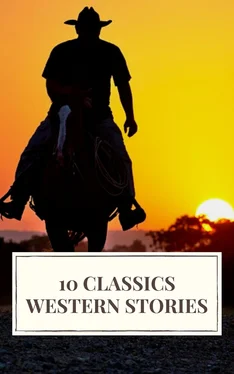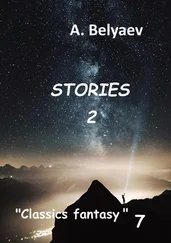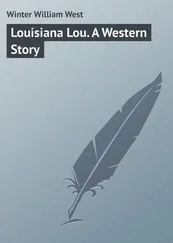Like flame within the naked hand
His body bore his burning heart.
Dante Rossetti.
Wappatto Island had seen many gatherings of the tribes, but never before had it seen so large an assembly as on the opening day of the council. The great cottonwoods of the council-grove waved over an audience of sachems and warriors the like of which the oldest living Indian could not remember.
No weapons were to be seen, for Multnomah had commanded that all arms be left that day in the lodges. But the dissatisfied Indians had come with weapons hidden under their robes of deer or wolf skin, which no one should have known better than Multnomah. Had he taken any precautions against surprise? Evidently not. A large body of Willamette warriors, muffled in their blankets, lounged carelessly around the grove, with not a weapon visible among them; behind them thronged the vast and motley assemblage of doubtful allies; and back of them, on the outskirts of the crowd, were the faithful Cayuses, unarmed like the Willamettes. Had Multnomah’s wonderful astuteness failed him now when it was never needed more?
He was on the council-seat, a stone covered with furs; the Willamette sachems sat in their places facing him; and mats were spread for the chiefs of the tributaries. On a bearskin before the stern war-chief lay a peace-pipe and a tomahawk; and to the Indians, accustomed to signs and symbols, the two had a grim significance.
One by one the chiefs entered the circle and took their seats on the mats provided for them. Those who were friendly to Multnomah first laid presents before him; those who were not, took their places without offering him either gift or salutation. Multnomah, however, seemed unconscious of any neglect.
The chief of a Klamath tribe offered him a brilliantly dyed blanket; another, a finely fringed quiver, full of arrows; another, a long and massive string of hiagua shells. Each laid his gift before Multnomah and took his seat in silence.
The chief of the Chopponish presented him with a fine horse, the best belonging to his tribe. Multnomah accepted it, and a slave led it away. Then came Snoqualmie, bringing with him Cecil Grey. The chief’s hour of vengeance was at hand.
“Behold the white man from the land where the sun rises, the white shaman of whom all the tribes have heard. He is thine. Let him be the white slave of Multnomah. All the chiefs have slaves, but who will have a white slave like Multnomah?”
Cecil saw the abyss of slavery yawning before him, and grew pale to the lips. His heart sank within him; then the resolute purpose that never failed him in time of peril returned; he lifted his head and met Multnomah’s gaze with dignity. The war-chief bent on him the glance which read men to the heart.
“The white stranger has been a chief among his own people,” he said to Cecil, more in the manner of one asserting a fact than asking a question.
“I have often spoken to my people in the gatherings to hear the word of the Great Spirit.”
Again the keen, inscrutable gaze of the great chief seemed to probe his being to its core; again the calm, grave stranger met it without shrinking. The instinct, so common among savage races, of in some way knowing what a man is, of intuitively grasping his true merit, was possessed by Multnomah in a large degree; and the royalty in his nature instinctively recognized the royalty in Cecil’s.
“The white guest who comes into the land of Multnomah shall be to him as a guest; the chief should still be chief in any land. White stranger, Multnomah gives you welcome; sit down among the chiefs.”
Cecil took his place among them with all the composure he could command, well knowing that he who would be influential among the Indians must seem to be unmoved by any change of fortune. He felt, however, not only the joy of personal deliverance, but mingled with it came the glad, triumphant thought that he had now a voice in the deliberations of the chiefs; it was a grand door opened for Indian evangelization. As for Snoqualmie, his face was as impassive as granite. One would have said that Cecil’s victory was to him a matter of no moment at all. But under the guise of indifference his anger burned fierce and deadly,—not against Multnomah but against Cecil.
The last chief had taken his place in the council. There was a long, ceremonious pause. Then Multnomah arose. He looked over the council, upon the stern faces of the Willamettes and the loyal tributaries, upon the sullen faces of the malcontents, upon the fierce and lowering multitude beyond. Over the throng he looked, and felt as one feels who stands on the brink of a volcano; yet his strong voice never rang stronger, the grand old chief never looked more a chief than then.
“He is every inch a king,” thought Cecil. The chief spoke in the common Willamette language, at that time the medium of intercourse between the tribes as the Chinook is now. The royal tongue was not used in a mixed council.
“Warriors and chiefs, Multnomah gives you welcome. He spreads the buffalo-robe.” He made the Indian gesture of welcome, opening his hands to them with a backward and downward gesture, as of one spreading a robe. “To the warriors Multnomah says, ‘The grass upon my prairies is green for your horses; behold the wood, the water, the game; they are yours.’ To the chiefs he says, ‘The mat is spread for you in my own lodge and the meat is cooked.’ The hearts of the Willamettes change not as the winters go by, and your welcome is the same as of old. Word came to us that the tribes were angry and had spoken bitter things against the Willamettes; yes, that they longed for the confederacy to be broken and the old days to come again when tribe was divided against tribe and the Shoshones and Spokanes trampled upon you all. But Multnomah trusted his allies; for had they not smoked the peace-pipe with him and gone with him on the war-trail? So he stopped his ears and would not listen, but let those rumors go past him like thistle-down upon the wind.
“Warriors, Multnomah has shown his heart. What say you? Shall the peace-pipe be lighted and the talk begin?”
He resumed his seat. All eyes turned to where the peace-pipe and the tomahawk lay side by side before the council. Multnomah seemed waiting for them to choose between the two.
Then Snoqualmie, the bravest and most loyal of the tributaries, spoke.
“Let the peace-pipe be lighted; we come not for strife, but to be knit together.”
The angry malcontents in the council only frowned and drew their blankets closer around them. Tohomish the seer, as the oldest chief and most renowned medicine-man present, came forward and lighted the pipe,—a long, thin piece of carving in black stone, the workmanship of the Nootkas or Hydahs, who made the more elaborate pipes used by the Indians of the Columbia River.
Muttering some mystical incantation, he waved it to the east and the west, to the north and the south; and when the charm was complete, gave it to Multnomah, who smoked it and passed it to Snoqualmie. From chief to chief it circled around the whole council, but among them were those who sat with eyes fixed moodily on the ground and would not so much as touch or look at it. As the pipe passed round there was a subdued murmur and movement in the multitude, a low threatening clamor, as yet held in check by awe of Multnomah and dread of the Willamette warriors. But the war-chief seemed unconscious that any had refused the pipe. He now arose and said,—
“The pipe is smoked. Are not our hearts as one? Is there not perfect trust between us? Now let us talk. First of all, Multnomah desires wise words from his brethren. Last winter one of the tribes rose up against Multnomah, saying that he should no longer be elder brother and war-chief of the tribes. But the rebels were beaten and all of them slain save the chief, who was reserved to be tried before you. You in your wisdom shall decide what shall be done with the warrior who has rebelled against his chief and stained his hands with the blood of his brethren.”
Читать дальше












